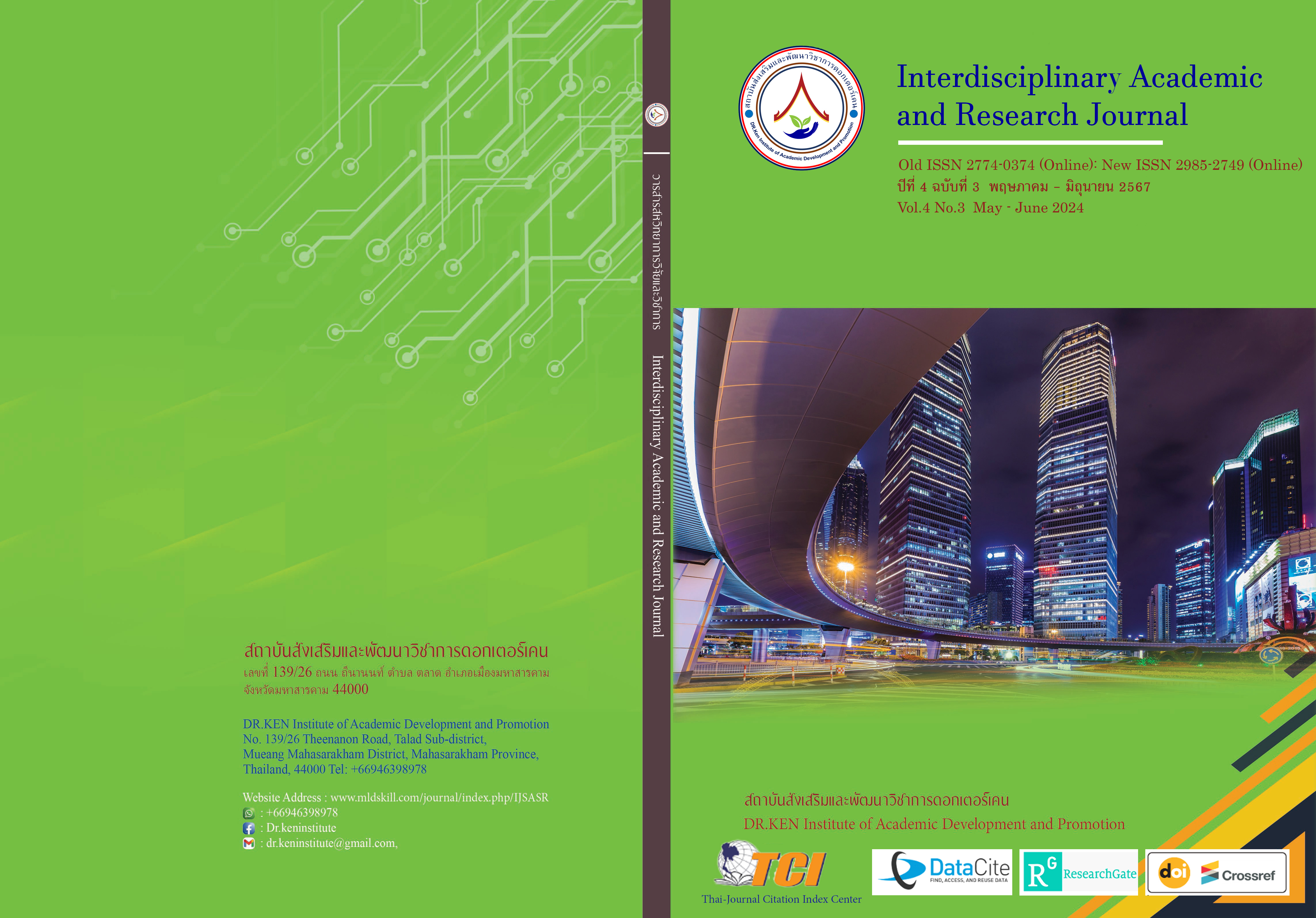Knowledge Management Affecting Innovative Organization Provincial Waterworks Authority, Branches of Provincial Waterworks Authority Regional Office 5
DOI:
https://doi.org/10.60027/iarj.2024.276652Keywords:
Knowledge Management;, Innovation Organization;, Provincial Waterworks AuthorityAbstract
Background and Aims: advancing the company in line with the current wave of globalization and technology advancements. Establishing an innovative culture within an organization is imperative, and knowledge management is a crucial component that all organizations should strive to incorporate as it plays a pivotal role in fostering innovation within the organization. Establishing strategies and visions for the organization's stability and sustainability, the Provincial Waterworks Authority is a branch of the Provincial Waterworks Authority District 5. The purpose of this research study was: 1) Investigate the level of knowledge management of Provincial Waterworks Authority employees under the Provincial Waterworks Authority Regional Office 5. 2) Investigate the level of innovative organization of Provincial Waterworks Authority employees under the Provincial Waterworks Authority, Regional Office 5. 3) Knowledge management affecting innovation organization Provincial Waterworks Authority, branches of Provincial Waterworks Authority Regional Office 5.
Methodology: Collected data by using a Questionnaire from a sample of 201 people. The statistics used to analyze the data were mean, standard deviation, and multiple regression analysis.
Results: (1) The overall level of knowledge management among employees of Provincial Waterworks Authority under Provincial Waterworks Authority Regional Office 5 was at the highest possible; this included creating, seeking, storing, searching, publishing, and applying knowledge in the proper order. (2) When it comes to innovation in products and services as well as process innovation, Provincial Waterworks Authority employees under Provincial Waterworks Authority, Regional Office 5 have the highest level of innovative organization. And (3) The impact of knowledge management on the innovative organization of Provincial Waterworks Authority employees, including branches and Regional Office 5.
Conclusion: The results indicate that the staff members of Provincial Waterworks Authority Regional Office 5 demonstrate remarkable expertise in knowledge management, which fosters increased innovation in a range of areas, such as services, processes, and products. Furthermore, the relationship that exists between knowledge management and organizational innovation highlights the critical function that knowledge utilization plays in promoting innovation within the framework of the Provincial Waterworks Authority.
References
กัลยารัตน์ ธีระธนชัยกุล. (2557). การจัดการความรู้..ปัจจัยสู่ความสำเร็จ. วรสารปัญญาภิวัฒ์, 5(1), 134-144.
ขวัญชนก แสงท่านั่ง. (2563).รูปแบบการพัฒนาสถานศึกษาสู่องค์กรแห่งนวัตกรรมสำหรับสถานศึกษาขั้นพื้นฐาน. วิทยานิพนธ์ปรัชญาดุษฎีบัณฑิต: มหาวิทยาลัยราชภัฏกำแพงเพชร.
จตุรงค์ นภาธร, สราวุฒิ พันธุชงค์,สุนิสา พ.ประสิทธิ์ และชลภัสสรณ์ เอื้อธนิกกานนท์. (2566). แผนยุทธศาตร์ด้านการจัดการความรู้และนวัตกรรมการประปาส่วนภูมิภาค พ.ศ.2566-2570. สำนักงานศูนย์วิจัยและให้คำปรึกษาแห่งมหาวิทยาลัยธรรมศาสตร์.
จุฑามาศ วัฒนอาภา (2566). อิทธิพลของการบริหารทรัพยากรมนุษย์ที่ส่งผลต่อการจัดการองค์ความรู้ของพนักงานในเขตกรุงเทพมหานครและปริมณฑล. วิทยานิพนธ์ปริญญาการจัดการมหาบัณฑิต : มหาวิทยาลัยมหิดล
จุฑามาศ อินตรา. (2564). การจัดการความรู้ที่ส่งผลต่อประสิทธิภาพการปฏิบัติงานของข้าราชการในหน่วยงานสำนักงานปลัดกระทรวงกลาโหม.วารสารการวิจัยการบริหารการพัฒนา, 11(2), 275-286.
ฐิติ เรืองฤทธิ์. (2560). ความเป็นองค์การแห่งการเรียนรู้ของสถานศึกษามัธยมศึกษา จังหวัดจันทบุรี สังกัดสำนักงานเขตพื้นที่การศึกษามัธยมศึกษาเขต 17. วิทยานิพนธ์ปริญญามหาบัณฑิต: มหาวิทยาลัยบูรพา.
ณัฐปภัสร์ สกุลพัฒน์รดา และจันทรัศม์ ภูติอริยวัฒน์. (2565). การเป็นองค์กรนวัตกรรมทางการศึกษาของโรงเรียนมัธยมศึกษาที่ได้รับรางวัลคุณภาพแห่งสำนักงานคณะกรรมการการศึกษาขั้นพื้นฐาน. วารสารศิลปะการจัดการ. 6(4), 1844-1861. http://thaijo.org/index.php/jam/article/view/256896.
พิชชาภา ตันเทียว. (2563). การศึกษาปัจจัยที่ส่งผลต่อการเป็นองค์กรนวัตกรมกรณีศึกษา การประปานครหลวง. วิทยานิพนธ์วิทยาศาสตรมหาบัณฑิต: มหาวิทยาลัยธรรมศาสตร์.
ภูวนาท มูลเขียน. (2553). การพัฒนากระบวนการจัดการความรู้เพื่อการบริหารสถานศึกษาขั้นพื้นฐาน. วิทยานิพนธ์การศึกษาดุษฎีบัณฑิต: มหาวิทยาลัยนเรศวร.
มณีกานต์ ดวงแก้ว และสุขุมวิทย์ ไสยโสภณ. (2564). การจัดการความรู้ขององค์กรปกครองส่วนท้องถิ่นจังหวัดอุดรธานี. วารสารสถาบันวิจัยและพัฒนามหาวิทยาลัยราชภัฏมหาสารคาม, 8(2), 169-196.
มรกต จันทร์กระพ้อ และกฤษดา เชียรวัฒนสุข. (2562). การสร้างองค์การแห่งนวัตกรรมเพื่อขับเคลื่อนสู่ความเป็นเลิศขององค์การ. วารสารนักบริหาร, 39(1), 52-66. https://so03.tci-thaijo.org/index.php/rdirmu/article/view/250754/172624
วินิดา หมัดเบ็ญหมาน. (2561). การพัฒนาแนวทางการจัดการความรู้ของวิทยาลัยหาดใหญ่ โดยใช้ KMMM. สารนิพนธ์ปริญญาวิศวกรรมศาสตรมหาบัณฑิต: มหาวิทยาลัยสงขลานครินทร์.
ศิริพรรณ ตันติวิวัฒนพันธ์. (2555). อิทธิพลของทรัพยากรเชิงเทคโนโลยี และเชิงพฤติกรรมต่อผลการดำเนินงานนวัตกรรมด้านผลิตภัณฑ์ และด้านกระบวนการขององค์การในประเทศไทย. วิทยานิพนธ์ปริญญาบริหารธุรกิจดุษฎีบัณฑิต: มหาวิทยาลัยรามคำแหง.
ศุมรรษตรา แสนวา. (2562).กลยุทธ์การจัดการความรู้ของห้องสมุดมหาวิทยาลัยของรัฐ. อินฟอร์เมชั่น, 26(2), 45-61. https://infojournal.kku.ac.th/index.php/information/article/view/62
อนิรุทร์ บุญเกื้อ. (2563).การพัฒนารูปแบบองค์กรนวัตกรรมของสถานศึกษาขั้นพื้นฐานในเขตกรุงเทพมหานคร. วิทยานิพนธ์ปริญญาครุศาสตร์อุตสาหกรรมดุษฎีบัณฑิต: สถาบันเทคโนโลยีพระจอมเกล้าเจ้าคุณทหารลาดกระบัง.
Krejcie, R.V., & Morgan D.W. (1970). Determining Sample Size for Research Activities. Psycholological measurement. 30(3), 607-610
Shih, W.-L., & Tsai, C.-Y. (2017). Students’ perception of a flipped-classroom approach to facilitating online project-based learning in marketing research courses. Australasian Journal of Educational Technology, 33(5). https://doi.org/10.14742/ajet.2884
Takeuchi, H., & Nonaka, I. (2004). Hitotsubashi on Knowledge Management. Singapore: John Wiley & Sons (Asia) Pte Ltd.
Downloads
Published
How to Cite
Issue
Section
License
Copyright (c) 2024 Interdisciplinary Academic and Research Journal

This work is licensed under a Creative Commons Attribution-NonCommercial-NoDerivatives 4.0 International License.
Copyright on any article in the Interdisciplinary Academic and Research Journal is retained by the author(s) under the under the Creative Commons Attribution-NonCommercial-NoDerivatives 4.0 International License. Permission to use text, content, images, etc. of publication. Any user to read, download, copy, distribute, print, search, or link to the full texts of articles, crawl them for indexing, pass them as data to software, or use them for any other lawful purpose. But do not use it for commercial use or with the intent to benefit any business.
















.png)


